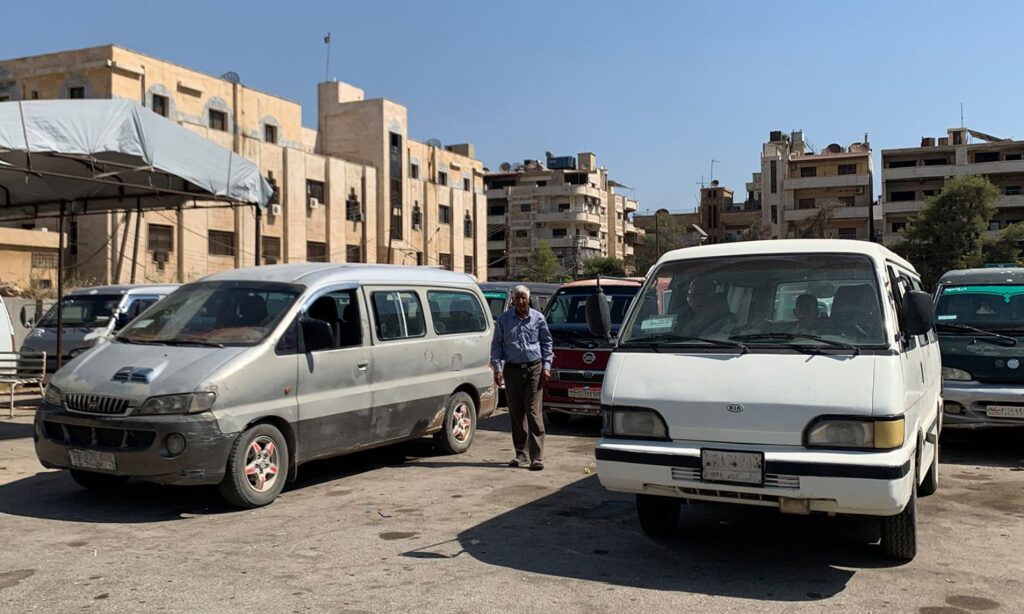Al-Hasakah – Majd al-Salem
With the fall of the previous Syrian regime and Bashar al-Assad’s escape to Russia, travelers from al-Hasakah to Damascus breathed a sigh of relief, particularly students and patients, after enduring great difficulties over the past years.
The journey, which usually takes 8 hours, sometimes extended to 24 hours due to the numerous security checkpoints and repeated inspections, making travel an exhausting and humiliating experience for many. After the regime’s collapse, there were significant changes in the travel reality between al-Hasakah and the capital.
A source of fear and terror for travelers
Under the control of the previous regime, security checkpoints were densely spread along the route between al-Hasakah and Damascus, especially those belonging to the Fourth Division, led by Maher al-Assad.
Khaled al-Hussein, a student from Qamishli studying economics in Damascus, had to stop with passengers at every checkpoint for hours, particularly in harsh weather conditions, as inspections were often exhausting and humiliating. Many travelers faced theft and humiliation at the hands of the regime’s checkpoints.
He told Enab Baladi that these checkpoints did not just obstruct travel but also created a source of anxiety and fear for passengers.
As for Malik al-Hussein (38 years old) from Qamishli, he recalls how he was deprived of accompanying his sick son, who had undergone a difficult surgery to remove a tumor from his neck in Damascus, as he feared arrest at one of the regime’s checkpoints.
Malik told Enab Baladi that his 80-year-old father had to travel and accompany his wife and sick child for about 24 hours to reach the capital, enduring suffering along the way due to the mistreatment from the regime’s checkpoints.
Malik added, citing his father’s experience, that the Fourth Division checkpoint would stop the bus for about 3 hours for inspection, requiring all passengers to close the curtains and remain inside the bus regardless of their circumstances, while the officers inspected the bags and “stole” whatever they pleased from them.
He noted that any traveler who dared to look out from the bus window would be beaten and insulted, as would the assistants and the bus driver.
“The Fourth Division State”
An employee at a transport company told Enab Baladi that trips used to take between 15 and 24 hours, as the bus would stop at the regime’s checkpoint for about four hours. There was only one lane available for buses, tankers, and civilian cars.
There were four checkpoints: the Fourth Division, followed by the Military Security, then the Political Security, and finally State Security, all spaced about a kilometer apart.
According to the employee, the methods of inspection and “theft” varied from one checkpoint to another, noting that the Fourth Division would verify all personal identification cards without requiring passengers to leave the bus, and this checkpoint took a cut from the money sent with the bus assistant.
For instance, every assistant would carry around 500,000 Syrian pounds, and each checkpoint would take 100,000 Syrian pounds from each bus. This amount changed over time, as the checkpoint would inform the company that prices had risen, saying, “The Fourth Division acts like a state on its own.”
Extortion and “theft”
The transport company employee mentioned that the Military Security checkpoint, in contrast to the Fourth Division, would unload all passengers and take them to a separate room for thorough inspection, charging about 50,000 Syrian pounds from the company.
Next came the Political Security checkpoint, which was “specialized in stealing diesel,” taking 25 liters of diesel that the company had prepared in special containers. The State Security checkpoint would also take 25 liters of diesel or sometimes request 50,000 Syrian pounds instead of the diesel.
The employee added that when there wasn’t enough diesel in the containers to distribute to the checkpoints, the checkpoint officers would siphon diesel from the main fuel tank of the bus, putting travelers at risk of being stranded on the road.
The employee further stated that the officers in charge of the checkpoints received monthly shares of between two and three million Syrian pounds, delivered by the company in Damascus “to facilitate the company’s operations at the checkpoints,” in addition to the gifts that were directly requested by the company, such as alcoholic beverages, perfumes, and cigarettes, and companies that did not pay would face operational delays, resulting in long waits at checkpoints “as punishment.”
Increased company profits, Relief among travelers
Currently, there is relief among passengers after being freed from all these checkpoints and the “abuses and violations” that used to occur.
Companies have rid themselves of the extortion that had been imposed, work has improved, profits have increased, and this has reflected in ticket prices.
The ticket price for a single passenger was 150,000 Syrian pounds and has now dropped to 137,000. Business class tickets, which used to cost 200,000 Syrian pounds, are now priced at 182,000.
According to what Enab Baladi observed from several travelers, they expressed their relief over the changes, especially after the reduction in travel duration and the elimination of extortion, with the only checkpoint demanding money being a checkpoint for the Syrian Democratic Forces (SDF) in the al-Tabqa area.
This checkpoint charges 2,000 Syrian pounds for each passenger under the name of “exit fee,” and at the entrance to Homs, there is one checkpoint belonging to the interim Damascus government, which inquires whether passengers have faced any problems during travel or if the companies have charged more than agreed.

